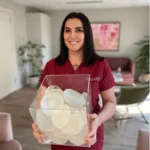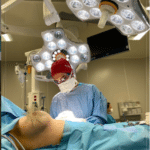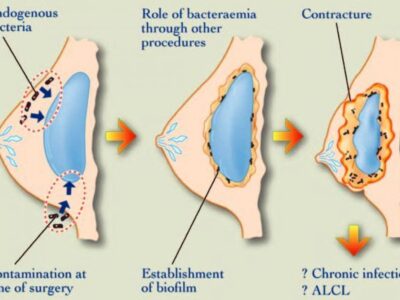 Capsular contracture treatment is performed by surgically removing the capsule formed after a previous breast augmentation operation.
Capsular contracture treatment is performed by surgically removing the capsule formed after a previous breast augmentation operation.
Breast augmentation surgery with breast implant is the most preferred aesthetic breast surgery as a breast augmentation method. The most common late complication in breast augmentation surgeries performed with breast implants and causing patients to be re-operated is called “capsule contracture”.
What is Capsular Contracture?
The human body activates the immune system when any foreign substance is placed, and a sheath synthesized by the connective tissue cells wraps the placed foreign substance and creates a barrier between the foreign substance and the body.
In breast augmentation surgeries, a sheath called a capsule is formed around the breast implants placed on the breast, consisting of myofibril fibers, collagen fibers and connective tissue cells. This capsule surrounds the breast implant and prevents the breast implant from slipping, which is beneficial.
In this case, the capsule formed is thin and flexible and does not cause any discomfort in the patients. In addition, the capsule tissue formed around the breast implant due to different reasons in some patients is thicker and harder than expected due to excessive connective tissue synthesis. As a result, the breast implant is tightened and the breast may begin to deform. This situation is called “capsule contracture”.
Capsule contracture is a common complication that can occur after breast augmentation surgery. It happens when the scar tissue that naturally forms around the implant (known as the capsule) starts to shrink and tighten, putting pressure on the implant.
This can cause the implant to change shape and become hard, leading to discomfort and an unnatural appearance of the breast. Risk factors for capsule contracture include smoking, infection, bleeding during surgery, and using textured implants. Treatment may involve surgery to remove and/or replace the implant and/or the capsule.
What Causes Capsular Contracture?
The exact cause of capsular contracture is not fully understood, but several factors are believed to contribute to its development, including:
- Bacterial contamination: Bacteria can enter the implant pocket during or after surgery and cause an infection, leading to capsule contracture.
- Textured implants: Textured implants have a higher risk of developing capsule contracture compared to smooth implants.
- Implant placement: Placing the implant above the muscle rather than under it may increase the risk of breast capsule.
- Smoking: Smoking can impair blood flow and slow the healing process, which can increase the risk of capsular contracture.
Bleeding during surgery: Blood inside the implant pocket can trigger an inflammatory response, leading to the formation of a thick capsule.
These are some of the known factors that may contribute to the development of capsular contracture. However, in many cases, the cause is unclear.
What are the capsular contracture symptoms?
- Hard breast: The breast may feel hard and may be painful to the touch.
- Misshapen breast: The breast may appear misshapen and may be higher on the chest than the other breast.
- Pain: Some people with capsular contracture may experience pain in the breast.
- Distortion: In severe cases, the implant may become visibly distorted.
- Implant displacement: The implant may shift out of place or change shape.
These are some of the most common of capsular contracture symptoms. If you are experiencing any of these symptoms or are concerned about your breast implants, it is important to speak with a plastic surgeon.
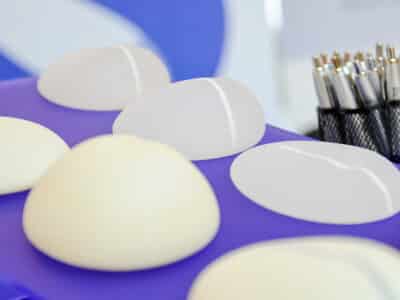 What are the Grades of Capsular Contracture?
What are the Grades of Capsular Contracture?
Capsular contracture is typically graded on a scale of I to IV, with grade IV being the most severe. The grades are based on the degree of breast firmness and the appearance of the breast:
- Grade I: No noticeable hardening or deformity of the breast.
- Grade II: Mild hardness of the breast, but the breast still has a natural appearance.
- Grade III: Moderate to severe hardness of the breast, with some deformity and a noticeable change in the shape of the breast.
- Grade IV: Severe hardness and deformity of the breast, with the implant being visibly distorted or ruptured.
It is important to note that the grades of breast augmentation capsular contracture are subjective and may vary among different plastic surgeons. If you are experiencing of capsular contracture symptoms, it is important to speak with a qualified plastic surgeon for a proper evaluation and diagnosis.
What are the capsular contracture treatment Methods?
The surgical treatment for breast implant contracture may include one or more of the following:
- Capsulectomy: This is the removal of the capsule that has formed around the implant.
- Implant exchange: This involves removing the existing implant and replacing it with a new implant.
- Capsulectomy and implant exchange: This involves removing both the capsule and the implant and replacing them with new ones.
- Revision surgery: This is a more extensive procedure that involves reshaping the breast tissue to improve the appearance of the breast.
- Conversion to a different type of implant: In some cases, the surgeon may recommend switching to a different type of implant, such as a breast implant, as an alternative to revision surgery.
The surgical treatment for breast implant contracture will depend on the severity of the condition, the patient’s preferences, and the surgeon’s recommendations. It is important to discuss all of your options with a qualified plastic surgeon to determine the best course of action for your individual needs and circumstances.
What are the capsular contracture treatment without surgery Methods ?
There are no proven for capsular contracture treatment without surgery. However, some surgeons may recommend the following as a way to manage mild cases:
- Massage: Gently massaging the affected breast can help to soften the capsule and reduce the symptoms of capsular contracture.
- Anti-inflammatory medications: Nonsteroidal anti-inflammatory drugs (NSAIDs), such as ibuprofen, can be prescribed to help reduce pain and inflammation associated with capsular contracture.
- Change in position: Changing the position of the implant by adjusting the a patient’s sleep position or changing the way they carry themselves can help to prevent further hardening of the capsule.
It is important to note that while these measures may provide some relief, they do not treat the underlying cause of breast augmentation capsular contracture and will not prevent it from recurring. In severe cases, surgery may be necessary to remove the capsule and/or replace the implant. It is important to speak with a qualified plastic surgeon to determine the best course of action for your individual needs and circumstances.
Does breast capsular contracture Occur Again After Treatment?
There is a possibility that capsular contracture can occur again after treatment, particularly if the underlying causes of the condition are not addressed. Some of the factors that can increase the risk of breast capsular contracture include:
- Bacterial contamination: Bacteria can enter the breast implant during or after surgery, leading to an increased risk of capsular contracture.
- Implant type: Certain types of implants, such as saline implants, may be more prone to breast implant contracture than others.
- Smoking: Smoking can increase the risk of breast augmentation capsular contracture by reducing blood flow to the breast and increasing the risk of infection.
- Trauma to the breast: Physical trauma to the breast, such as a fall or car accident, can increase the risk of capsular contracture.
- Immune system issues: Some medical conditions, such as lupus and rheumatoid arthritis can weaken the immune system and increase the risk of capsular contracture.
It is important to discuss the risk of breast augmentation capsular contracture with your plastic surgeon, as well as steps you can take to reduce your risk of developing this condition after treatment. In some cases, additional treatments or procedures may be recommended to prevent capsular contracture from reoccurring.
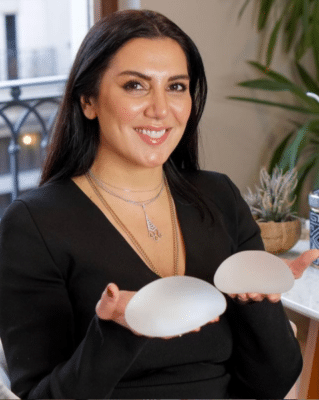 How Much Surgery of breast implant contracture Cost in Istanbul, Turkey?
How Much Surgery of breast implant contracture Cost in Istanbul, Turkey?
There are several factors that can affect the cost of capsular contracture repair, including:
Location: The cost of capsular contracture treatment can vary depending on the geographic location of the treating surgeon and the facility.
Surgeon’s experience: More experienced plastic surgeons may charge higher fees for their services, reflecting the increased level of skill and expertise required to perform the procedure.
Type of procedure: The cost of breast implant capsule treatment can vary depending on the type of procedure being performed, such as an implant exchange or revision surgery.
Type of implant: The cost of the implant itself can vary depending on the type of implant being used, such as silicone or saline.
Anesthesia: The cost of anesthesia can also affect the overall cost of the procedure.
It is important to keep in mind that the cost of breast capsular contracture treatment can vary widely depending on a number of factors. It is recommended to consult with a qualified plastic surgeon to get an estimate of the cost of treatment and to ensure that you receive the best care possible.
It is also important to carefully consider the potential benefits and risks of treatment, as well as your individual goals and circumstances, before making a decision. You can learn your price information in the most accurate way at the end of the examination. For Ministry of Health-accredited centers, it is not legal to specify prices on their website. Therefore, please dial 0212 241 46 24 to contact Quartz Clinique and get information on Capsular Contracture Treatment Prices In İSTANBUL, TURKEY.


